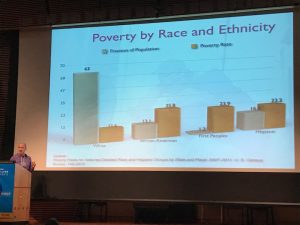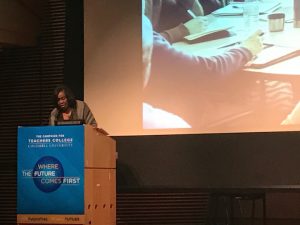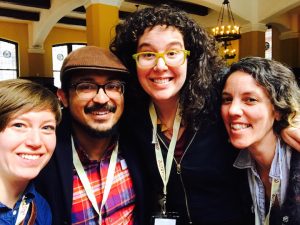
The Just Food Conference 2017: A Call to Collaboration
On March 12th and 13th I attended the Just Food Conference in NYC. It was exciting to reconnect with the Just Food community, as I spent much of 2012 as an intern with their Farm School NYC program. Just Food has always inspired me with their commitment to lifting up the leadership and capacity of diverse communities in the food movement to build a more just, equitable and sustainable food system, and this year’s conference entitled “A Call to Collaboration” was no different. The conference included workshop tracks ranging from Community-Led Food Projects to Policy and Advocacy to Youth Leadership in the Food Justice Movement and more, keynote speakers, local strategy sessions, and opportunities to plug into local campaigns for food justice and sovereignty.
The core question of the conference was “through collaboration, what can we do together across our many disciplines to increase the amount of fresh, locally grown food available in our most marginalized, food insecure communities in ways that support self-determination and ensures economic justice for all?” One of the workshops I went to that best represented the theme of collaboration was a panel called “Farm to Bed Stuy: The Worker Cooperative Approach to Building a Local Supply Chain”. Worker/owners from Rock Steady Farm and Flowers, the Brooklyn Packers and Bed Stuy Fresh and Local shared their model of moving food along the supply chain from being grown in Millerton NY, getting packed in Bed Stuy, Brooklyn, and then delivered to a Bed Stuy cooperative storefront to be sold to the local community.
All of the worker/owners of these three cooperatives spoke about their desire to merge profitability and food justice, and the possibilities and challenges inherent in this goal. Building a network of support along the supply chain and working in economic partnership with other businesses with shared values was a huge boost for this work. Priorities for all three businesses included finding creative ways to fund projects in an effort to keep prices affordable for consumers, and supporting not only food access but business ownership for residents of color in Bed Stuy. The panel was moderated by a staff member at The Working World, a non-extractive lender who funds and offers training to cooperative businesses. It was really inspiring to learn about a financer who is not interested in taking people’s money to turn a profit but instead in genuinely supporting small co-ops to be successful.
A large part of the conference on the second day focused on action planning and next steps. I went to a strategy session on Food Chain Issues and why it’s so challenging for good food to be both affordable for communities and profitable for small farmers. We identified many of the barriers to food access, including lack of a shared baseline understanding of what affordability means, a food chain that is ambiguous to many, lack of a shared analysis of historical inequities in the food system, federal policies, and more. We also began a group brainstorm of ways individuals and communities can work to reduce the cost of food without harming farmers.
Both keynote speakers, Director of FoodLab Detroit Devita Davison and Dr. Ricardo Salvdor, the Food and Environment Program Director at the Union of Concerned Scientists spoke about the historical roots of racism and classism in the food system that continue to play out today. Dr. Salvador shared that “the future of food justice is  the future of the country”, and that food and the struggles around it are so core to who this country is and has been that there is no way to make forward progress without addressing it. He spoke to the reality that the ways Black, Latinx and Indigenous people and low income people have been deprived of their food base throughout history through land theft, enslavement and disenfranchisement have been core to the creation of the economic poverty many people experience today.
the future of the country”, and that food and the struggles around it are so core to who this country is and has been that there is no way to make forward progress without addressing it. He spoke to the reality that the ways Black, Latinx and Indigenous people and low income people have been deprived of their food base throughout history through land theft, enslavement and disenfranchisement have been core to the creation of the economic poverty many people experience today.
 Devita Davison shared about the importance of Black ownership and entrepreneurship in food and farming, as opposed to charity models. It was powerful to hear her talk about the human revolutionary capacity to exercise creativity in the face of destruction, and the importance of visioning, faith and relationships in bringing forth the food justice work and labor of love we want to see. It has been a large focus of Groundswell in recent months to ground ourselves in the history of both oppression and creativity/regeneration in U.S. agriculture, and it was beneficial and inspiring to hear the perspectives and framing of these two leaders.
Devita Davison shared about the importance of Black ownership and entrepreneurship in food and farming, as opposed to charity models. It was powerful to hear her talk about the human revolutionary capacity to exercise creativity in the face of destruction, and the importance of visioning, faith and relationships in bringing forth the food justice work and labor of love we want to see. It has been a large focus of Groundswell in recent months to ground ourselves in the history of both oppression and creativity/regeneration in U.S. agriculture, and it was beneficial and inspiring to hear the perspectives and framing of these two leaders.
 In all, I was glad for the opportunity to attend the Just Food Conference, connect with old friends from NYC (and Ithaca farmers too!), brainstorm with people from around the state about justice and equity in the food supply chain, and learn about the work and organizations of many powerful farmers and activists. It also made me even more excited for the Farm to Plate Conference, coming to Ithaca May 11th-13th!
In all, I was glad for the opportunity to attend the Just Food Conference, connect with old friends from NYC (and Ithaca farmers too!), brainstorm with people from around the state about justice and equity in the food supply chain, and learn about the work and organizations of many powerful farmers and activists. It also made me even more excited for the Farm to Plate Conference, coming to Ithaca May 11th-13th!
